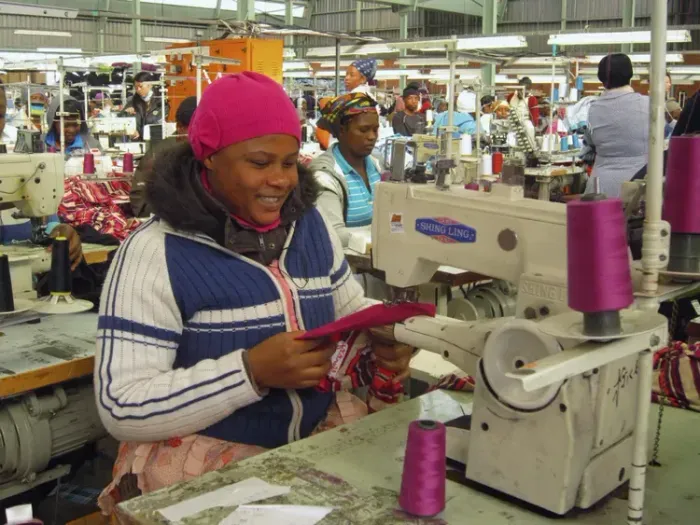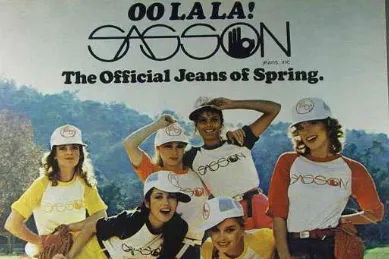
The writer reminisce about the country's thriving clothing and textile industry before it was destroyed when the government lowered tariffs for Chinese imports
Image: Reuters
It's fascinating the way the world has suddenly latched onto the word "tariffs" since Donald Trump has once again become president.
But for me, who grew up in Cape Town, that word carries a much heavier weight than just a headline.
It brings back a flood of memories, tinged with a deep sadness for what we lost. Thirty years ago, when our own government started cutting tariffs, especially with China, we watched as the heart of Cape Town's clothing industry was ripped out. It was a lifeline for so many, and its destruction left scars that still run deep.
Growing up in the Southern suburbs, my wardrobe was built almost entirely from the factory shops.
Every clothing manufacturer had these "side doors" open to the public, overflowing with garments at a fraction of the retail price. It taught me a lifelong habit of never needing a clothing account because quality clothes were simply affordable for everyone.

We remember the profound impact of tariff reductions had on Cape Town's clothing industry.
Image: Wikipedia
I remember the chaos of entering Venus, one of the biggest factory shops in Lansdowne, run by the Patel family. Huge wooden crates would be piled high with overruns of the latest fashion.
Mrs. Patel, always in her silk sari and gleaming gold jewellery, would stand on a platform like a queen, barking orders at staff to repack the mountains of clothes.
Then there was Beeline, more organised, almost like a proper retail shop, selling fashion items practically at cost.
They dominated underwear manufacturing, churning out Triumph underwear and Speedo swimsuits for export around the globe.
Their factory shop was always buzzing with women searching for top-quality items at amazing prices.
Aaron and Adele Searle the couple behind it, were some of Cape Town’s real philanthropists, often seen in the Cape Times society pages for their charitable work.
They started with a small factory in Salt River, making nurses' caps, and built an empire that became the largest clothing and textile producer on the African continent, employing over 10,000 people at its peak.
Then came the tariff reductions in the mid-1990s, a consequence of South Africa joining the World Trade Organisation (WTO) and embracing trade liberalisation.
Suddenly, cheap imports, particularly from China, flooded our markets. Local manufacturers, burdened by higher production costs, simply couldn't compete.
The impact was devastating. The South African clothing and textile industry, once a significant employer, shed tens of thousands of jobs and saw countless factories close their doors. Seardel, that mighty empire, went into liquidation in 2018, unable to withstand the relentless pressure.
Salt River Main Road, once lined with suit manufacturers like Rex Trufom, Fabiani, and Ralph Lauren Polo, which exported men's and women's business suits to high-end consumers worldwide, became a shadow of its former self.
We used to buy a men's suit for less than half the retail price, and if it didn't fit, a seamstress on site would tailor it for a few extra rand.
I recall being in Harrods in London and seeing a pair of khaki cotton Polo chinos for £150 (around R3,500). I hesitated, knowing I'd be back in Cape Town soon, and sure enough, I found the exact same chinos at Access Park for R150.
In the 80s, they were a big deal, our South African answer to Guess Jeans, with iconic marketing campaigns shot in Cape Town, featuring glamorous models next to vintage cars. That brand, too, saw its journey changed by the tides of trade.
It wasn't just Cape Town. In Durban, Clairwood, once the vibrant heart of South Africa's shoe manufacturing industry, became a ghost town, a direct result of the influx of cheap imported footwear.
So, as tariffs once again hit the headlines, perhaps those countries with thriving local industries should pause and consider.
Thirty years on, we in South Africa live with the stark reality of what trade liberalisation and reduced tariffs can truly do to local manufacturers and economies.
It's a cautionary tale of the empty factories and lost livelihoods of our once-thriving clothing industry.
IOL Lifestyle
Related Topics: